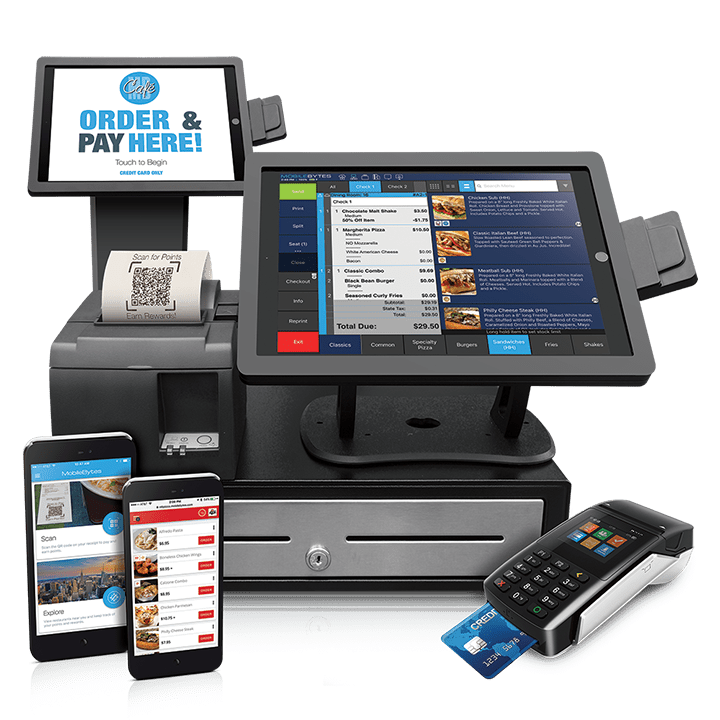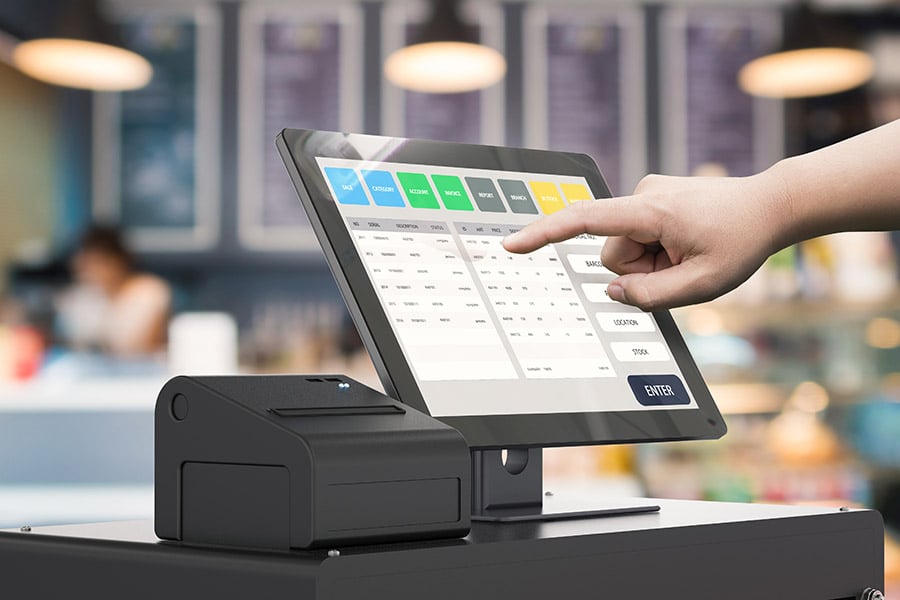All About Clover Pos
All About Clover Pos
Blog Article
Point Of Sale Software Things To Know Before You Buy

Restaurant POS: Retail Point-Of-Sale Solutions Streamline Deals
Some Of Clover Pos

Hardware Components of a Point of Sale System What makes a POS system tick? It's not just software application; the hardware plays a starring role. Believe of it as the body to the software application's brain. Without the best hardware, even the most advanced POS software application is just a pretty face. Essential POS Hardware So, what are the must-haves? Let's break it down. The central processing unit, frequently a computer system or tablet, is the heart of the operation. The screen or touchscreen display enables personnel to communicate with the system. A barcode scanner accelerate the checkout process. Keep in mind the days of by hand going into each code? The dependable invoice printer supplies clients with a record of their purchase. A cash drawer keeps your cash safe and organized. A card reader permits consumers to pay with credit or debit cards. Diving Deeper: Beyond the Essential However wait, there's more! Depending upon your company, you might need specialized hardware. For instance, a restaurant may incorporate cooking area printers to relay orders, while a retail store may use label printers for product tagging. Ever wonder how your regional bakery instantly prints those delicious-looking labels? Selecting the Right Hardware: A Balancing Act Choosing the best hardware isn't almost buying the most costly devices. It has to do with finding the sweet area in between functionality, toughness, and spending plan. A small company simply beginning may decide for a more standard setup, while a high-volume seller will require robust, high-performance devices. Is it much better to buy new or used? Consider your choices thoroughly. A new system uses the current innovation and guarantee defense, but a here refurbished system can conserve you money. The Future of POS Hardware What does the future hold? Expect to see much more combination with mobile gadgets, biometric scanners for worker authentication, and advanced analytics dashboards showed on bigger, clearer screens. Think of a world where inventory is automatically updated in real-time as items are scanned-- a world where you can track your best-selling item from throughout the world. The possibilities are unlimited, and the hardware is continually progressing to fulfill the needs of today's organizations. Are you all set to upgrade your point of sale system?
Software Application Features and Capabilities: The Heart of Your POS System
Ever view a seasoned barista glide through a hectic early morning rush? Their trick isn't just caffeine; it's a seamless dance with their POS system. The software application is the conductor of your company symphony, orchestrating everything from sales to inventory. What notes should you be listening for? What capabilities really matter in today's market?
Inventory Management: Beyond Counting Beans
Forget spreadsheets that haunt your dreams. Modern POS systems use real-time stock tracking, alerting you when your stock of artisanal coffee beans dips precariously low. Think about it as a digital guardian angel, avoiding those awkward "Sorry, we're out!" moments to customers. What if you could also anticipate need based on historic data? Lots of systems now provide forecasting tools, a powerful weapon against overstocking and lost sales. This helps prevent the circumstance of lacking popular items or building up excess inventory of slow-moving products, both of which can constrain capital and space.
Sales Reporting and Analytics: Deciphering the Data
Sales information is the new gold, and your POS system is the miner. Forget simply understanding how much you sold today. Dive deep into the data to discover trends, identify your best-selling products, and understand customer habits. Which menu item sets perfectly with the daily special? Which promo resonated most with your clients? These insights are not just interesting; they're actionable intelligence. Without reliable sales reporting, browsing the intricacies of service decision-making ends up being like cruising without a compass, increasing the opportunity of bad moves and missed opportunities.
Client Relationship Management (CRM): Structure Bridges, Not Walls
Remembering a routine consumer's name and preferred order is lovely, however scaling that individual touch is difficult. POS systems with CRM capabilities enable you to track consumer purchase history, preferences, and even birthdays. Envision automatically offering a discount on their birthday-- a little gesture that fosters commitment and encourages repeat company. There is the potential snag of poor information quality, which can lead to inaccurate customer profiles and inefficient marketing efforts.
Payment Processing: Improving the Transaction
The checkout experience can make or break a sale. Smooth integration with different payment methods-- charge card, mobile wallets, even copyright-- is non-negotiable. Can your system manage split payments? Does it use protected tokenization to protect consumer data? A cumbersome payment process resembles hitting a sour note in your organization symphony, possibly interfering with the entire performance. Ensuring compatibility with developing payment innovations and adherence to security requirements are paramount for maintaining customer trust and operational effectiveness.
Employee Management: Keeping the Team in Sync
From clocking in and out to handling permissions and tracking efficiency, worker management features streamline operations and improve responsibility. Is scheduling a nightmare? Numerous POS systems offer integrated scheduling tools, enhancing staffing levels based upon predicted need. A typical barrier that is often overlooked is the difficulty of incorporating employee management functionalities with payroll systems, which can cause mistakes and inadequacies in wage calculations.
Advanced Features: Leveling Up Your Operations
- Table Management: Perfect for dining establishments, this function permits you to visualize your dining room, track table status, and handle bookings.
- Loyalty Programs: Reward your best customers and motivate repeat business with integrated commitment programs.
- Online Buying Integration: Flawlessly incorporate your POS system with online ordering platforms to broaden your reach.
Choosing the ideal POS system is about more than simply performance; it's about discovering a partner that can grow with your company. Consider your existing requirements, prepare for future growth, and do not be scared to ask the difficult questions. The right software application can transform your business from a chaotic cacophony into an unified masterpiece.
Industry-Specific POS System Applications
Believe of the local pastry shop, dynamic with morning customers yearning fresh croissants. A generic POS system might manage deals, but can it handle complex dishes, track component inventory, or instantly adjust production schedules based upon sales data? Most likely not. That is where the charm of industry-specific POS systems shines.
Dining establishments and Hospitality
For busy dining establishments, speed and accuracy are critical. The number of times have you seen servers handling orders, modifications, and splitting costs, all while attempting to offer exceptional service? A dining establishment POS system enhances these procedures, permitting table management, cooking area order tickets, and even online purchasing integration. These systems frequently include features like ingredient-level stock tracking, important for handling food costs and reducing waste. Ever question why your preferred meal is sometimes not available? It may stem from an absence of appropriate inventory management.
- Table Management
- Kitchen Area Order Tickets
- Online Buying Integration
- Ingredient-Level Inventory Tracking
Retail Solutions
Retail, with its varied inventory and customer interactions, requires a different set of tools. Envision a store clothing store struggling to track sizes, colors, and seasonal collections utilizing a fundamental checkout system. An industry-specific retail POS system provides features like barcode scanning, consumer loyalty programs, and detailed sales reporting. These systems can even integrate with e-commerce platforms, providing a seamless omnichannel experience for customers. Did you understand some retail POS systems can predict future sales patterns based upon historic data? Now that is effective!
The Perils of a Mismatch
Picking the incorrect POS system can produce considerable operational difficulties. A clothing store using a restaurant POS, for instance, would discover it inappropriate for managing stock with sizes and colors. The lack of correct reporting and analytics could cause mistaken getting choices and lost revenue. The outcome might be comparable to attempting to fit a square peg in a round hole.
Secret Considerations
Choosing an industry-specific POS system needs cautious evaluation. Think of your service's distinct needs and operational workflows. Does the system integrate with existing software application? Does it provide the needed reporting abilities? Is it scalable to accommodate future development? A well-chosen POS system is not simply a deal tool; it's a strategic possession that can drive efficiency, improve customer complete satisfaction, and ultimately, boost your bottom line. Remember, it is a financial investment in your company's future, not simply an expense.
Security Factors To Consider for Point of Sale Systems
Ever heard the tale of the mom-and-pop shop that lost whatever due to the fact that of a single, neglected security defect in their POS system!.?. !? It's a cautionary tale, and it highlights an important aspect frequently overshadowed by the appeal of expensive functions and streamlined operations. The truth is, a POS system is only as excellent as its security. What great is a system that crunches numbers in a flash if it allows wrongdoers to swipe customer's information just as quickly?
The Vulnerability Minefield
The digital landscape is a battleground. Every POS system, regardless of size or elegance, is a potential target. Are you genuinely got ready for the threats lurking around the corner? The genuine pinch comes when you find that your outdated software application has a gaping hole that hackers can exploit, turning your organization into an unwitting accomplice in identity theft. The problem is that hackers are crafty and are always changing their methods.
Common Security Spaces and Professional Tips
- Weak Passwords: "Password123" isn't sufficing. Usage strong, distinct passwords for all POS system accounts and change them frequently. Two-factor authentication is a must.
- Unsecured Networks: Your Wi-Fi is like leaving the front door open. Protect your network with strong file encryption (WPA3 if possible) and think about a different network for your POS system.
- Out-of-date Software: Software application vendors spot security holes all the time. Stopping working to upgrade resembles inviting trouble. Establish automated updates or schedule regular maintenance.
- Employee Training: Your staff is your first line of defense. Train them to acknowledge phishing efforts, protect passwords, and report suspicious activity.
Data Encryption: Your Guard Versus the Dark Arts
Think of information encryption as a secret code. It scrambles sensitive info, like charge card numbers, making it unreadable to unapproved users. Without file encryption, your consumers' financial details resemble sitting ducks, ripe for the selecting by cybercriminals. It's not just about securing your customers; it has to do with safeguarding your track record and preventing substantial fines.
PCI Compliance: The Rulebook You Can't Neglect
If you accept credit cards, you're bound by the Payment Card Industry Data Security Requirement (PCI DSS) It's a set of security standards designed to protect cardholder information. Stopping working to comply can result in fines, charges, and even the loss of your capability to process credit card payments. It's a headache, yes, but it's an essential one. Think about PCI compliance as the cost of doing service in the digital age.
Consider this: every deal processed through your point of sale is a potential entry point for destructive stars. By implementing robust security steps, you're not simply safeguarding your company; you're securing your clients' trust and guaranteeing the long-lasting practicality of your operations. The security of your POS system isn't simply a technical issue; it's a service imperative. It needs continuous alertness, proactive steps, and a dedication to staying ahead of the curve.